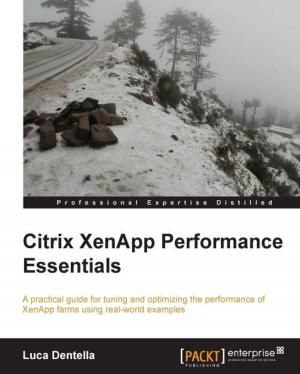| Author: | Erik Rose | ISBN: | 9781847198136 |
| Publisher: | Packt Publishing | Publication: | March 1, 2006 |
| Imprint: | Packt Publishing | Language: | English |
| Author: | Erik Rose |
| ISBN: | 9781847198136 |
| Publisher: | Packt Publishing |
| Publication: | March 1, 2006 |
| Imprint: | Packt Publishing |
| Language: | English |
Break the webmaster bottleneck by empowering instructors and staff
About This Book
- Enable instructors and staff to represent courses using Plone's built-in content types—news items, collections, and events—without writing a single line of code
- Embed sound and video into your course materials, news feeds, or anywhere on your Plone site
- Written by Erik Rose—member of the Plone 4 and 5 Framework Teams
- Expert guidance on using the best plug-ins so that you can get the best out of your site right from the beginning
Who this book is for
Plone 3 for Education is for the makers of school web sites, from primary to university, from e-learning to public-facing, from tech-savvy teachers to seasoned software developers. A user-level familiarity with Plone is the only prerequisite; everything else is baked in.
What You Will Learn
- Build common e-learning tasks in Plone: assignment schedules, course materials, online turn-in forms, and class interaction using podcasts and forums
- Build school-wide and department-wise directories collecting contact info, biographies, and more
- Take care of necessities, like customizing the look of your site, setting up a production server, and running incremental backups
- Integrate audio and video with Plone: weaving it into pages, populating portlets, and podcasting it to the world
- Harness Plone4Artists Calendar product to improve the display of event listings
- Find tips on information architecture and usability, learning from the successes and mistakes of several sites
In Detail
Plone enables your faculty and staff to manage their own web sites, but some assembly is still required. How do you represent courses online? What about assignment schedules, lecture podcasts, and collaborative spaces? That's where this book comes in—it takes the burden of routine updates off your web team by harnessing the world's most advanced free content management system.
This is the school web team's missing manual. Through step-by-step examples covering 11 common educational use cases, you'll learn how to take the box of parts provided by Plone, combine them with best-of-breed third-party plug-ins, and turn out a dynamic web environment that will be a joy to use for faculty, enhance staff productivity, and engage the student body.
Plone is powerful but complex. Its ease of use for end users belies a wealth of under-the-hood features and third-party add-ons that are time-consuming for back-end web teams to sort through. The book guides you on proven paths through the forest of potential that you encounter during design and deployment, starting you with reasonable choices for each of 11 common education-domain use cases. Each one enumerates the value it brings to your site and guides you step-by-step through an implementation suitable for the vast majority of cases, meaning you can spend your time addressing the unique needs of your institution-not reinventing the wheel.
Style and approach
This book is written especially for time-constrained web teams. Every chapter is hands-on from start to finish, focusing on getting a value-adding site up fast. Necessary theory and tips on best practices are interspersed with the step-by-step instructions, broken out into sidebars so it informs your progress without impeding it. Also, every chapter is independent, dealing with a specific use case—for example, publishing video, creating forms, or representing assignment schedules and syllabi—so you can skip straight to what you need.
Most chapters require no programming at all. The few where we dig deeper (for example, to build our own plug-in products) are replete with working code samples and explanations of what's going on. A rudimentary knowledge of the Python programming language is helpful in these but is not essential.
Break the webmaster bottleneck by empowering instructors and staff
About This Book
- Enable instructors and staff to represent courses using Plone's built-in content types—news items, collections, and events—without writing a single line of code
- Embed sound and video into your course materials, news feeds, or anywhere on your Plone site
- Written by Erik Rose—member of the Plone 4 and 5 Framework Teams
- Expert guidance on using the best plug-ins so that you can get the best out of your site right from the beginning
Who this book is for
Plone 3 for Education is for the makers of school web sites, from primary to university, from e-learning to public-facing, from tech-savvy teachers to seasoned software developers. A user-level familiarity with Plone is the only prerequisite; everything else is baked in.
What You Will Learn
- Build common e-learning tasks in Plone: assignment schedules, course materials, online turn-in forms, and class interaction using podcasts and forums
- Build school-wide and department-wise directories collecting contact info, biographies, and more
- Take care of necessities, like customizing the look of your site, setting up a production server, and running incremental backups
- Integrate audio and video with Plone: weaving it into pages, populating portlets, and podcasting it to the world
- Harness Plone4Artists Calendar product to improve the display of event listings
- Find tips on information architecture and usability, learning from the successes and mistakes of several sites
In Detail
Plone enables your faculty and staff to manage their own web sites, but some assembly is still required. How do you represent courses online? What about assignment schedules, lecture podcasts, and collaborative spaces? That's where this book comes in—it takes the burden of routine updates off your web team by harnessing the world's most advanced free content management system.
This is the school web team's missing manual. Through step-by-step examples covering 11 common educational use cases, you'll learn how to take the box of parts provided by Plone, combine them with best-of-breed third-party plug-ins, and turn out a dynamic web environment that will be a joy to use for faculty, enhance staff productivity, and engage the student body.
Plone is powerful but complex. Its ease of use for end users belies a wealth of under-the-hood features and third-party add-ons that are time-consuming for back-end web teams to sort through. The book guides you on proven paths through the forest of potential that you encounter during design and deployment, starting you with reasonable choices for each of 11 common education-domain use cases. Each one enumerates the value it brings to your site and guides you step-by-step through an implementation suitable for the vast majority of cases, meaning you can spend your time addressing the unique needs of your institution-not reinventing the wheel.
Style and approach
This book is written especially for time-constrained web teams. Every chapter is hands-on from start to finish, focusing on getting a value-adding site up fast. Necessary theory and tips on best practices are interspersed with the step-by-step instructions, broken out into sidebars so it informs your progress without impeding it. Also, every chapter is independent, dealing with a specific use case—for example, publishing video, creating forms, or representing assignment schedules and syllabi—so you can skip straight to what you need.
Most chapters require no programming at all. The few where we dig deeper (for example, to build our own plug-in products) are replete with working code samples and explanations of what's going on. A rudimentary knowledge of the Python programming language is helpful in these but is not essential.















